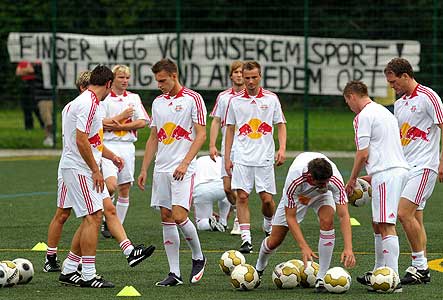“Football is dying here”
Article published: Friday, August 14th 2009
Manchester City fans may have welcomed the multi-billion pound take over of their club, relishing the opportunity to see superstars play at the City of Manchester stadium. Elsewhere in Europe new owners have not been greeted with open arms.

"Hands off our sport. In Leipzig and everywhere else."
Last weekend, the football season started in Germany. Surprisingly, it was a match from the 5th division that grabbed the public’s attention: Carl Zeiss Jena II v. RB Leipzig. However, this was not due to spectacular goals or poor refereeing decisions, but to the violence surrounding the game. Spectators threw bottles at Leipzig’s team bus and started a blockade in order to prevent it from entering the ground. During the match, Leipzig players were allegedly spat at. Fans reportedly shouted death threats from the stands. Before the season had even started RB’s pitch had been damaged, and a wooden cross, which read “football is dying here”, had been hammered into it.
Why the furor? Supporters across Germany see the establishment of RB Leipzig as the latest step in the corporate takeover of top-flight football in Germany. Big companies already control three Bundesliga clubs: Volkswagen, Bayer and software-maker SAP hold sway over current champions Wolfsburg, the 2002 Champions League finalists Leverkusen, and Hoffenheim respectively.
The corporation behind RB Leipzig is drinks manufacturer Red Bull. In recent years, they have been expanding systematically into all manner of sports. They not only control RB Leipzig, but also current Austrian champions Red Bull Salzburg, the Major League Soccer team New York Red Bulls, and two Formula One teams. It is no secret that the establishment of RB Leipzig was a strategic business move. Leipzig has 513,000 inhabitants and is situated at the heart of a densely-populated area in East Germany. It was one of the host cities of the 2006 World Cup, and there is a modern stadium seating 45,000. However, Leipzig’s established football clubs have mostly been unsuccessful since German re-unification. Both the 1986 European Cup Winners’ Cup finalists Lokomotive Leipzig and traditional enemies Sachsen Leipzig have not been playing at league level for years. This makes Leipzig an ideal place to establish a new football club with big ambitions. The professed goal is to establish RB as a top flight team in the space of eight years.
Accordingly, Red Bull decided to take over suburban club SSV Markranstädt and give it a new name that serves its marketing purposes. They invested heavily in new players, among them former German international Ingo Hertzsch. There are claims circulating in the media that Red Bull are planning to spend €100m (£86m) in order to develop the club.
Supporters worry that corporate ‘take-overs’ will give some teams an unfair advantage and establish a sanitised and bland football culture, much like – as some say – the top four and the ‘prawn sandwich brigade’ in the Premier League. There is a widespread fear that the Bundesliga will suffer if corporate-controlled clubs push traditional teams with large fan bases to the margins. Hans-Joachim Watzke, managing director of 1997 Champion League winners Borussia Dortmund, has openly attacked Wolfsburg, Leverkusen, and Hoffenheim: “If there are one or two more clubs of this kind the much-feted boom in attendance in the Bundesliga will be over soon”.
Alex Gallas
More: News
Comments
-
united fans did the some interesting stuff when they got bought out and lumbered with all that debt.
Comment by Dave on August 14, 2009 at 6:31 pm -
good to see some more football articles up! keep it up
Comment by MP on August 18, 2009 at 1:03 pm
The comments are closed.



